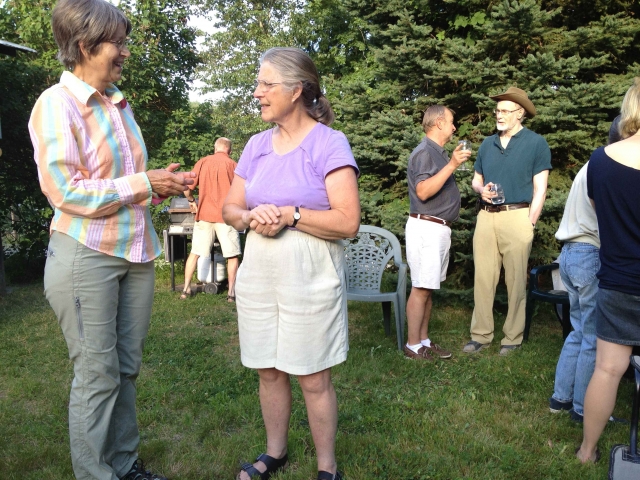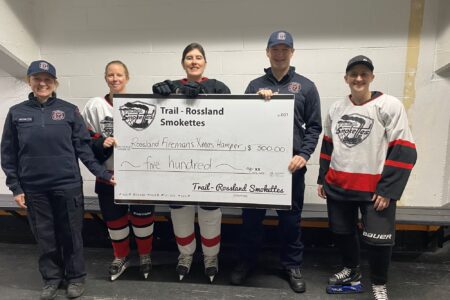MP Alex Atamanenko slams the Conservative corporate agenda at Rossland potluck, encourages action
After a potluck dinner at Andy Morel’s house in Rossland on Tuesday—and after the diners had each expressed their concerns about the current Conservative leadership in Ottawa and Canada’s lurch to the right—MP Alex Atamanenko offered some of his observations and experiences.
“Thanks for all the food!” Atamanenko began, before diving into the power of the corporate sector over decision makers, the gutting of everything from cooperatives to “habitat” in the fisheries act by the omnibus Bill C-38, to the Enbridge pipeline and proposed changes to riding boundaries.
The corporate agenda
Atamanenko said, “I believe we’re at a stage where the battle—if we can use war terminology—is between the corporate sector and their agenda, and what the rest of us want.”
“Bill C-38, this omnibus bill: goodness, it contains something like 70 changes to 70 pieces of legislation.”
“Science is going by the wayside; A lot of people call it the ‘pipeline bill’ or the ‘energy bill,’ the fact that it’s going to streamline environmental regulations, taking ‘habitat’ out of the fisheries act; we can go on and on.”
“Those of you who have followed what my colleague Elizabeth May has done, she’s taken all the environmental aspects of the bill and just listed them. They’re huge! And that’s the agenda.”
“So how do we push back?”
Cooperatives
“Somebody mentioned cooperatives. There’s been funding cut to the whole cooperative initiative in Canada under this budget, something that Canadians value.”
“As we speak, there’s an all-party committee listening to witnesses on cooperatives at the initiative of a Liberal MP. MPs are listening to what people have to say about cooperatives. I know there’s someone from Castlegar who is a witness.”
“But you wonder what will happen even if the committee comes out with recommendations to strengthen cooperatives, because we see what’s going on with the agenda.”
Out-voted and the inner circle of influence
“It’s very hard for us. Even though I belong to the Official Opposition—and for other opposition parties—it’s really hard because the vote comes and they out-vote us. The time is gone when we could form coalitions, or we could form a block against this government.”
“In the last NDP leadership race I supported Nathan Cullen, and one of the reasons that I did is that he advocated some kind of cooperation between parties to go against the Conservatives.”
“The other reason [I supported Cullen] was that he committed to me that had he become leader and Prime Minister, proportional representation would have become one of his main points.”
“Our leader Tom [Mulcair] has chosen Nathan to be House Leader, and that’s a pretty important position. He basically looks after all the business in the House of Commons in Parliament. He’s part of what I call the ‘inner circle.'”
“Parties have inner circles. I don’t happen to be part of the inner circle. But Nathan is, and he can use his influence there to push for proportional representation.”
“We’ve seen in the past that parties will say something’s a good idea when they’re in opposition, but when the get elected and get power, they don’t want to do it any more. We have to get beyond that.”
Coalitions, Cooperation, Jack Layton, and Michael Ignatieff
“The idea of working with the Liberals: I certainly was, as many Canadians, very excited and encouraged that we were able to get together with a coalition, with Stéfan Dion and Jack [Layton] with the support of [Gilles] Duceppe of the Bloc.”
“I’m disappointed, first off, that the Liberals got rid of Stéfan Dion. And I’m extremely disappointed that [Michael] Ignatieff didn’t want to even touch this.”
“I got to know Jack Layton fairly closely. We used to work out together in the gym. He told me, ‘You know, it took a whole year for Ignatieff to meet with me.'”
[Angela Price commented, “God, that’s slow!”]
“So when Liberals talk and they say, ‘We’ve got to get together,’ I point that out. Ignatieff could have been Prime Minister today, had he chosen to work together with us and with the Bloc, we could have voted that government down, we would have had no election, and he would have been Prime Minister today in a coalition government.”
“Why didn’t that happen? Something else that Jack told me, and Jack had a lot of words of wisdom that I tapped into: he said, ‘On Bay Street, you’ve got this whole corporate sector. On one end of the hallway you’ve got the people who support the Conservatives; on the other end, that’s the people who support the Liberals.”
“My colleague Wayne Easter, the former Liberal agriculture critic, a really hard-working man from PEI. He said, ‘Alex, in our party we’ve got three factions: the right, the centre, and the left-leaning.'”
“My analysis of the situation: the power brokers in the corporate sector of the Liberal party didn’t want that coalition to take place.”
“Why didn’t they choose Bob Rae? Why did they put in Ignatieff without any vote? He then toed the line, said ‘No coalition.’ He lost, and this is where we are today.”
“There could be, there needs to be, some movement towards cooperation between Elizabeth—and hopefully some other members we can elect from the Green Party—the Liberals, and us going into the next election. How that manifests itself? I don’t know. There has to be an openness.”
Thomas Mulcair
Kathy Moore asked, “How does Mulcair feel about cooperation with the other parties?”
Atamanenko responded, “I don’t know, to be honest. He’s a realist. If he sees that we have to form a government with help from others, he may be open to that.”
Moore said, “We’re going to be with the Conservatives forever unless the opposition gets some strength.”
Atamanenko continued, “First of all, I think the Liberal party has to decide who they are. They have to get their leader and decide are they going to follow an agenda similar to ours and that a majority of Canadians want? Or are they going to be closer to the Conservatives?”
“Then the new leader, and our leader, have to start some discussions along with Elizabeth.”
The NDP and the corporate agenda
“I would be a fool to say, ‘If the NDP gets into power, federally, next election, everything will be fine.’ It doesn’t work that way.”
“Those of us who belong to political parties have to work within the party to influence the policy.”
“I’ll bet that the critics in our party and our leader are feeling the pressure from the corporate sector. It’s perceived that we could form government in three years.”
What’s a citizen to do?
A potluck participant asked, “What can we do to support the conversation about cooperation on the left?”
Atamanenko said, “All of us who belong to political parties have to work on our parties’ leaderships.”
The participant clarified, “So join a political party?”
Atamanenko said, “That’s one way of doing it.”
“What I try to do in my job is present ideas to my leadership. And that’s one of them that I’ve been talking about ever since I was elected.”
“All these great ideas [shared at the potluck], if you’d like me to share them with Tom or our respective critic, send me an email or letter and I’ll forward it on. That’s my role to try to influence my party.”
“Don’t forget that Nathan is working with [Mulcair], and Nathan agrees with this, so there’s a chance that something could be worked out.”
Food sovereignty
“What I’m trying to do is to influence my party so we shape an agriculture policy, a Canadian food strategy through a ‘food sovereignty’ lens.”
“As we continue to trade with other countries as we have done for years, we should also understand that food security and food sovereignty are important for our survival as a nation.”
“That’s an are I’ve been involved in—my tour across Canada [in 2009, the Food for Thought Tour—and I’m working with our critic Malcolm Allen to shape a policy so that hopefully, when we come into the next election, we’ll have a Canadian food strategy.”
“The only policy the Conservatives have is to ‘open up more markets.’ That’s their whole philosophy.”
Issue-by-issue alliances
“I’m still on this campaign to stop GMOs.”
“An unexpected ally: I have a councillor in Keremeos who is a member of the Conservative party but who is totally against the whole idea of GMOs. Here we are, allies.”
“I think we can build allies on issues. I say this to members of all political parties: if we agree on something, let’s work within our parties to change. Parties have policy conventions; we can work through that whole process.”
Atamanenko noted similar alliances he has recently built with Conservatives on the issue of horse slaughter for human consumption in Alberta, and how he encourages them to write to their Conservative MPs.
Broad support for change
Atamanenko said, “This doesn’t belong to the left. I think there are people right across the country who aren’t happy with what’s going on.”
“I got a call from a real estate agent in Oliver. He said, ‘I’ve been voting Conservative all my life, I’ve supported these guys. I read your article [on how the C-38 omnibus bill exempts federal construction contractors from paying the going union or equivalent wage.]'”
“He said, ‘You know, I’m a realtor, and who’s going to buy a house at $14 per hour?’ He said, ‘I support unions, they put money into our economy. There’s something wrong here. I’m looking at you folks and it’s very possible I’ll be voting NDP in the next federal election.”
“This is happening, this is what this movement is. Whatever way we can do it, whether it’s pressure groups, or petitions, or letters: get that message out that we want to take our country back.”
“There is a direction, and it’s the wrong direction we’re going in. We need to take it back.”
Realignment of electoral boundaries
“They do this every ten years, they want to realign the boundaries based on population. The [Boundary Commission] want to add six new ridings in BC.”
“We’re a bit down in numbers [in the Southern Interior riding], as is Kootenay-Columbia, and they’re proposing to take Nelson, Fruitvale, Montrose, Salmo and move them into Kootenay-Columbia, the East Kootenay riding. And they propose to cut us off at Keremeos and give us Penticton.”
Angela Price commented, “That’s bulls**t!”
Atamanenko said, “They tried that last time and Jim Gouk, the previous MP, to his credit, rallied and was able to stop that.”
“There seems to be a consensus. Penticton does not want to be part of this riding. Their council just passed a resolution, they want to stay with Summerland.”
“The three regional districts are all opposed to the proposal.”
“My task is contacting Greg [Granstrom] and all the other mayors and councils, saying, ‘Are you aware of what’s going on? Would you like to validate, or keep the status quo?”
“We’re getting this momentum building up to the hearings that will take place in our area on Oct. 2 and 3. If you’re interested in making an oral or written submission, you have to make your intent known by Aug. 30.”
“We as citizens can speak up and say, ‘No, this is wrong, this isn’t the right way of doing about this.'”
Price asked, “Alex, is this about numbers or is it about diluting the green vote that is so strong in the West Kootenay?”
Atamanenko said, “If I were really cynical, I’d say it’s some kind of gerrymandering to beef up the Conservative vote, but I think it’s numbers. It’s somebody sitting and looking at the map and juggling based on numbers.”
Kathy Moore said, “It’s not critical that they do this boundary change [noting that the 10 per cent difference of this change doesn’t meet the threshold criteria of a 25 per cent difference]. It’s critical that they get these six new ridings [near Vancouver] where the population has really grown. There’s no real reason for them to change us. I take the cynical view myself.”
Sara Golling said, “I encourage people to express themselves on this issue to Greg [Granstrom].”
Moore said, “Actually, write to all of council, not just the mayor.”
Energy and the Northern Gateway Project
“We’re speaking out against Enbridge.”
“A lot of our MPs in the Lower Mainland are concerned about the twinning of the Kindred-Morgan pipeline. We haven’t come out strong against that because the provincial NDP is waiting to see—we have to kind of work together. If they eventually come out against this, as they did against Enbridge, I’m sure we’ll have a position.”
“The twinning of Kindred Morgan would triple the tanker traffic in English Bay, it’s as simple as that.”
“Enbridge: I was up there a couple months ago. It’s unbelievable what this proposal would do.”
“Even now, if you have an oil spill and can clean up 30 per cent of it, that’s considered good. Seven per cent clean up in raw bitumen is considered good. That’s it! The rest of it sinks and you’ve lost those pristine waters forever, basically.”
“Let alone what would happen to that pipeline going through that terrain. [There are] hard facts about what could happen and the potential damage.”
A participant asked, “Is it a done deal, regardless of grassroots opposition?”
Atamanenko said, “When we were at Kitimat Village, meeting with the First Nations there, they said, ‘We’re exploring all legal options.'”
“If that doesn’t happen, you can expect people on the ground blocking this.”
“Provincial NDP leader Adrian Dix has come out strong against this, and they’re exploring legal options.”
“I don’t think it’s a done deal.”
Next steps
“The people we elect to our provincial government next May will send a strong message, federally. We’ve got issues. The timeline is now to pinpoint each party, each leader.”
“I think organizations like LeadNow.ca, and they do a scorecard or something and come out and say: these are the people we should be voting for. That’s okay. That will put some brakes on what’s going on federally, if we throw these guys out provincially.”
“That’s why I joined the NDP. I didn’t like what was happening in my province. That was my choice.”
“Apart from being in a political party, I think we need to elect a government who represents our values. If we can start by doing that here, we can do that in two years federally.
“We need to focus in on the issues. It’s important now, it’s crucial.”
























